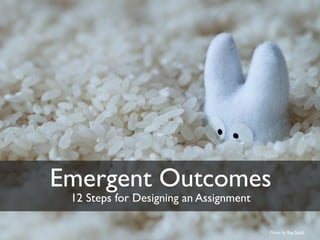
12 steps for Designing an Assignment with Emergent Outcomes
- 1. Emergent Outcomes 12 Steps for Designing an Assignment Photo by Ray Smith
- 2. Jesse Stommel @Jessifer You can also follow Mary the Dog @MLAdog
- 3. “An unhealthy attachment to outcomes discourages experimentation.” ! ! ~ Sean Michael Morris, Pete Rorabaugh, and Jesse Stommel, “Beyond Rigor”! Photo by Jeff Kubina
- 4. Don’t wield outcomes like a weapon. Learning and teaching are about inhabiting the present not the future, letting our possible paths evolve as we do. Photo by flickr user 55Laney69
- 5. We haven’t been nearly imaginative enough with outcomes. I want outcomes like “for us to have an epiphany” or “for students to do something I couldn’t anticipate.” Photo by flickr user Giovanni Arteaga
- 6. 12 Questions I ask myself when creating an assignment 1. What are my primary goals for students with this assignment?! 2. How do my goals for this assignment intersect with my broader teaching philosophy?! 3. What tools that I already use (analog or digital) could help me achieve these goals?! 4. In order for this activity / class to work, what gaps do I need to fill with other tools / strategies?! 5. Is my idea simple enough? What can I do to streamline the activity? ! 6. What is my goal beyond this assignment / course? How will the activity (and my pedagogy) evolve?! Bring students into design as early as possible making the work about their goals and not just our own. ! 7. Go back to step 1 and work through steps 1-6 again (and likely several times).! Consider the next steps “below the fold”, because assessment should never drive our pedagogies.! 8. Does this activity need to be assessed? Or does the activity have intrinsic value?! 9. Is there a way to organically build the assessment into the assignment itself?! 10.What additional assessment strategies should I use? External summative assessment should be a last resort.! 11.What is my goal in assessing student work? Is my assessment enhancing student learning?! 12.Go back to step 8. Particularly, reconsider the question: Does this activity need to be assessed?
- 7. What are my primary goals for students with this assignment? (1)
- 8. “Too often, faculty design pedagogy around the worst-case scenario and then apply that pedagogy to every student."! ~ Janine DeBaise, “Best Practices: Thoughts on a Flash Mob Mentality”! Photo by sciencesque
- 9. How do my goals for this assignment intersect with my broader teaching philosophy? (2)
- 10. “Curriculum [...] is constructed and negotiated in real time by the contributions of those engaged in the learning process.”! ~ Dave Cormier, “Community as Curriculum”! Photo by Wetsun
- 11. What tools that I already use (analog or digital) could help me achieve these goals? (3)
- 12. It is often best to use the tools with which we are already familiar, rather than turning to the shiny and newfangled. Photo by flickr user Francesco Lodolo
- 13. In order for this activity / class to work, what gaps do I need to fill with other tools / strategies? (4)
- 14. Bring students into the conversation as early as possible by having them collaborate on the syllabus, outline the objectives of the course, design activities and assessments, etc. Photo by Jan Plogmann
- 15. Is my idea simple enough? What can I do to streamline the activity? (5)
- 16. Don’t feel like you have to meet all the goals during the first attempt — think of the process, from the start, as iterative with student goals ultimately supplanting our own. Photo by flickr user Matthias Rhomberg
- 17. What is my goal beyond this assignment / course? How will the activity (and my pedagogy) evolve? (6)
- 18. Outcomes for an assignment emerge over time through the work of each group of students. If I articulate outcomes too clearly at the start, students are less able to articulate them. Photo by luca savettiere
- 19. Go back to step 1 and work through steps 1-6 again (and likely several times). (7)
- 20. Consider the next steps “below the fold”, because assessment should never drive our pedagogies. Rather, good assessment is driven by good pedagogy. Thus, I continue by asking myself: Photo by flickr user Patrick Smith
- 21. Does this activity need to be assessed? Or does the activity have intrinsic value? (8)
- 22. Teachers often grade in many more situations than grading is actually required. We should avoid with a gusto any impulse that turns students into mere columns in a spreadsheet. Photo by flickr user twinkabauter
- 23. Is there a way to organically build the assessment into the assignment itself? (9)
- 24. "When students struggle for excellence only for the sake of a grade, what we see is not motivation but atrophy of motivation."! ~ Peter Elbow, “Grading Student Writing: Making It Simpler, Fairer, Clearer”! Photo by Kalexanderson
- 25. What additional assessment strategies should I use? External summative assessment should be a last resort. (10)
- 26. These might include self-assessment, peer-assessment, narrative feedback, points, a rubric, a letter grade, or some combination. Photo by flickr user Dmitry Krendelev
- 27. What is my goal in assessing student work? Is my assessment enhancing student learning? (11)
- 28. The goal of education should always be better learning and not better assessments. Photo by flickr user Johnny Worthington
- 29. Go back to step 8. Particularly, reconsider the question: Does this activity need to be assessed? (12)
- 30. “A class is … an independent organism with its own goal and dynamics. It is always something more than what even the most imaginative lesson plan can predict.”! ! ~ Thomas P. Kasulis, “Questioning” Photo by Praline3001
- 31. bit.ly/assignmentdesign! ! ! @Jessifer Photo by flickr user Taro Taylor
